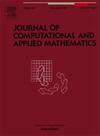分数阶混合Chelyshkov函数在求解一类一般弱奇异核分数阶积分微分方程中的应用
IF 2.6
2区 数学
Q1 MATHEMATICS, APPLIED
Journal of Computational and Applied Mathematics
Pub Date : 2025-09-30
DOI:10.1016/j.cam.2025.117110
引用次数: 0
摘要
近年来,人们发展了各种分数阶基函数来解决不同类型的分数阶问题。介绍了一类由块脉冲函数和车里什科夫多项式构造的分数阶混合函数。利用Riemann-Liouville积分算子,我们得到了车里什科夫多项式的封闭形式的显式结果。然后利用这些结果建立了求解一类具有弱奇异核的分数阶积分微分方程的数值格式。该方法与Caputo导数和Riemann-Liouville算子的基本性质相结合,导致了与主要问题相关的余数的定义。通过选择合适的配点,将问题转化为可解方程组。建立了该方法的误差界,并通过实例验证了该方法的有效性。本文章由计算机程序翻译,如有差异,请以英文原文为准。
Application of fractional-order hybrid Chelyshkov functions for solving a general class of fractional integro-differential equations with weakly singular kernels
In recent years, various fractional-order basis functions have been developed to tackle different types of fractional problems. This paper introduces a new class of fractional-order hybrid functions constructed from block-pulse functions and Chelyshkov polynomials. By applying the Riemann–Liouville integral operator, we derive explicit results using the closed form of Chelyshkov polynomials. These results are then employed to develop a numerical scheme for solving a general class of fractional integro-differential equations with weakly singular kernels. The approach, combined with the essential properties of the Caputo derivative and the Riemann–Liouville operator, leads to the definition of remainders associated with the main problem. By selecting suitable collocation points, the problem is transformed into a solvable system of equations. An error bound is established for the proposed approximation, and the effectiveness of the method is demonstrated through several illustrative examples.
求助全文
通过发布文献求助,成功后即可免费获取论文全文。
去求助
来源期刊
CiteScore
5.40
自引率
4.20%
发文量
437
审稿时长
3.0 months
期刊介绍:
The Journal of Computational and Applied Mathematics publishes original papers of high scientific value in all areas of computational and applied mathematics. The main interest of the Journal is in papers that describe and analyze new computational techniques for solving scientific or engineering problems. Also the improved analysis, including the effectiveness and applicability, of existing methods and algorithms is of importance. The computational efficiency (e.g. the convergence, stability, accuracy, ...) should be proved and illustrated by nontrivial numerical examples. Papers describing only variants of existing methods, without adding significant new computational properties are not of interest.
The audience consists of: applied mathematicians, numerical analysts, computational scientists and engineers.

 求助内容:
求助内容: 应助结果提醒方式:
应助结果提醒方式:


